I Want to Protest.
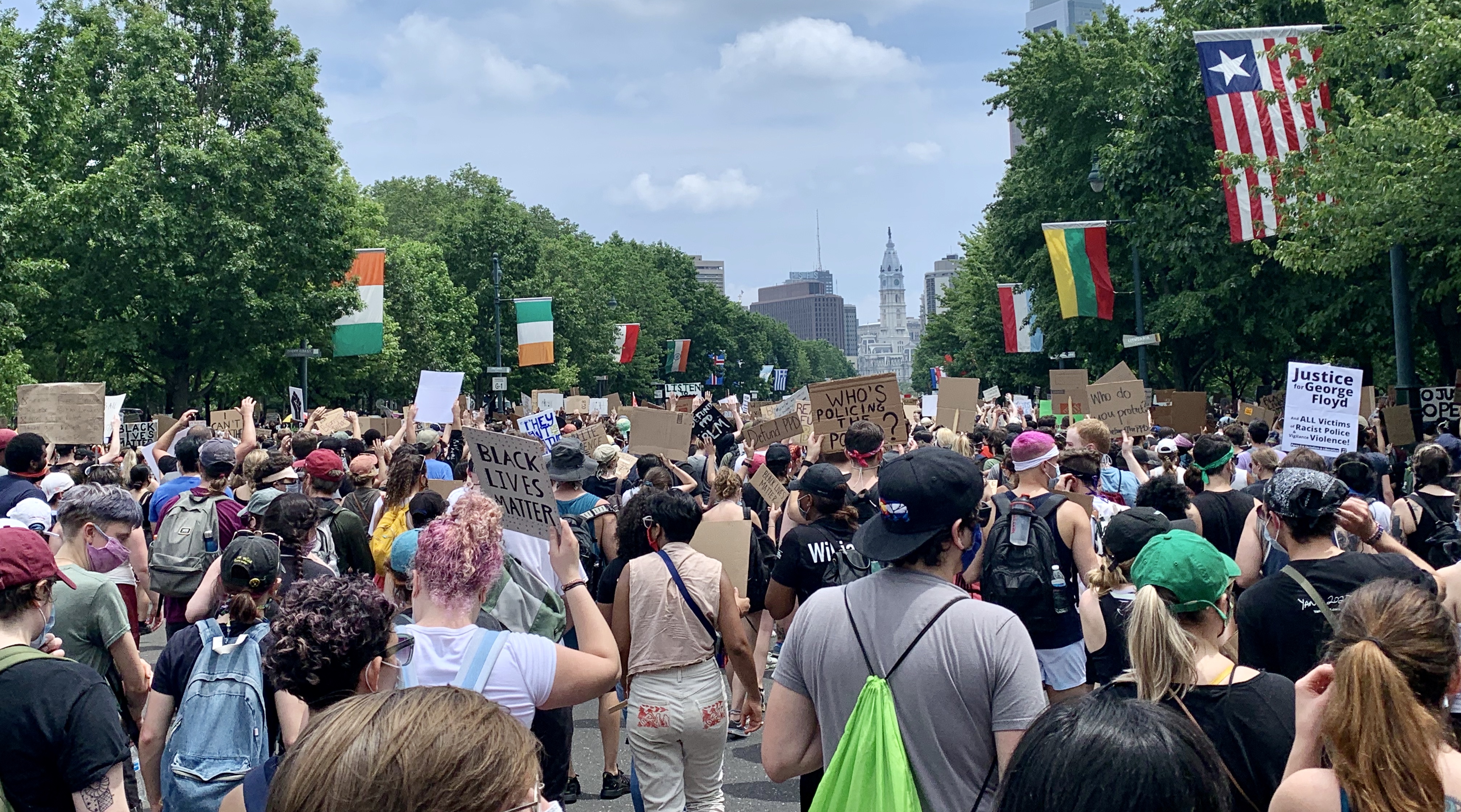
While we may show up with every intent to be a peaceful protester (and thus nothing bad should happen), we are still subject to the choices of others (i.e. the police) when we protest. While I hope much of this ends up being overkill, it’s better to have given it thought than not, if you end up in a less than favorable situation. This should go without saying, but if you don’t feel well, please stay home.
Please familiarize yourself with the demands of the Black Philly Radical Collective, and prioritize events that align with their demands and amplify their voices.
Before the protest
1. Get clear about your intent. Who are you showing up for? Why are you choosing to show up?
When we are grounded in our intentions, we can better stay true to the mission, feel motivated, and firm in our choices. Channel this into some beautiful sign art!
(Don’t forget to closely vet who is organizing and endorsing the event, and their demands.)
2. Consider if there is a specific role you can play.
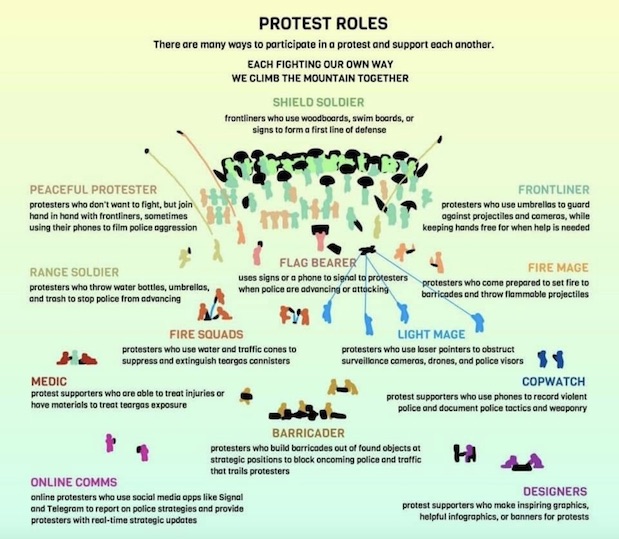
Organizing is no small feat. If you feel you have a specific skill to offer, reach out to organizers - it is probably needed.
3. Dress the part

Ideally, choose dark clothing that covers you completely and does not identify you (school names, logos, etc.). If possible, wear a hoodie that can be cinched around your face and protects your hair from being pulled. If you have skin exposed, cover any tattoos or piercings that may identify you. Do not wear jewelry. Choose sturdy shoes that you could run in. And of course, as we are living in a pandemic… wear a mask. If you feel the need to be extra protected, or feel there is possibility of escalation, add a helmet, goggles, gas mask, gloves, elbow and knee pads to your get-up.
4. What should you bring?
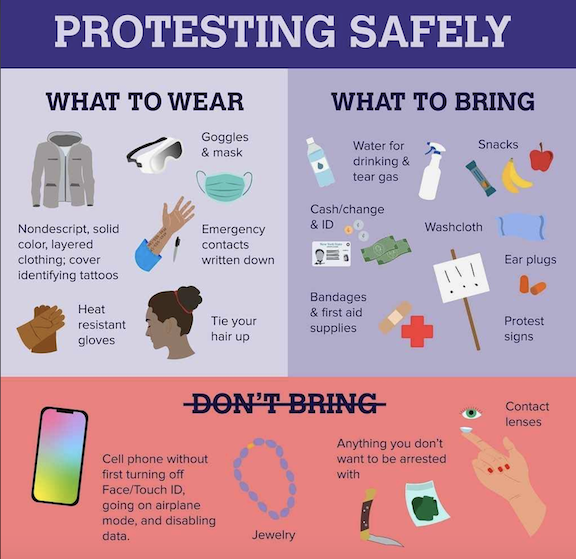
In short, as little as possible. Don’t bring anything you wouldn’t part with permanently. Choose a small backpack or fanny pack to carry things in.
- ID
- Cash (for bail - more on that later), if possible
- Water & snacks
- Water and baking soda solution for tear gas
- First aid supplies (there are usually volunteer medics, but don’t assume you will be able to locate one immediately if needed)
- Important medication (for anxiety/panic attacks, asthma attacks)
- A protest buddy!
- If you bring your cell phone:
- Best practice is to wipe your phone and disable touch ID and face ID to avoid divulging any data or info you wouldn’t want attached to your name. Police may not access your phone without a warrant.
- If you can’t bring yourself to wipe it clean, turn on airplane mode and disable all location services BEFORE you head out to the protest
- Avoid photos/videos of other people’s faces to protect those around you too.
5. How do I set up jail support?
As a peaceful protester, this isn’t something you should need, but the times sadly show us that we don’t always have a choice. In the event of an arrest, a jail support contact will take care of your immediate home-life needs and contacting your loved ones. Fill out a jail support form like this one or this one and leave it with your designated jail support buddy, along with spare keys if needed.
Decide on a time to check in with your jail support. If the action is scheduled to end at 5pm, let them know you will check in around then, or tell them when you are home safe. In the absence of your check-in, they will know to take action.
Write down the number of your jail support buddy on your body, along with a phone number that will connect you to expert legal service. There are several organizations that are designed for this exact purpose, and several law firms and lawyers who are offering pro bono legal support at this time. (The following are Philadelphia-specific)
- Up Against the Law: 484-758-0388 (Primary recommendation. They are also an amazing source for preparing for actions and knowing your rights)
- Attorney Michael Coard: MichaelCoardX@gmail.com
- Philadelphia Lawyers for Social Equity: info@plsephilly.org
During the protest
1. Don’t engage with police. Don’t engage with the press.
But do keep a watchful eye on your surroundings, and keep tabs on the movements and actions of police.
2. (If you’re not black) Be an allied body
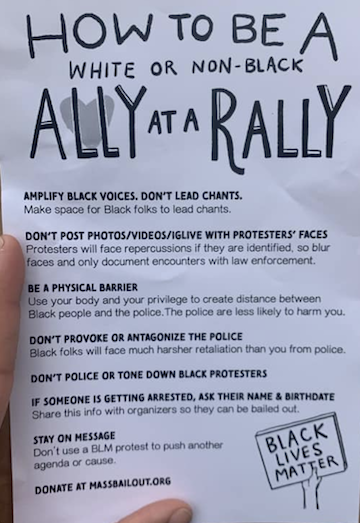
That means letting your black community members lead physically (if they so choose), and verbally with chants. Additionally, if you hold white privilege, be willing to be a physical body between your black community members and police in the event of confrontation.
3. Check in with your friends, and yourself!
Remember to stay hydrated, and check in on everyone’s comfort level, including your own. You are always free to depart if you are feeling uncomfortable or unsafe in the situation.
4. If you are stopped by police:
Taking photographs and video is protected under the First Amendment. Ask if you are free to go; if so, walk away calmly and do not say anything. If you are not, you may ask why you are being detained. Police must have ‘reasonable suspicion’ that you are about to, or are in the process of committing a crime to detain you.
5. If police intervene:
a. Police verbally order the group to disperse
You should decide ahead of time whether you plan to obey such a direction or not. If you decide not to, you’re no longer protesting, you are participating in non-violent direct action (NVDA) which is a totally different ball game. A good practice is to decide your maximum level of ‘rebellion’ ahead of time, and know that you can always move down in the moment. I don’t recommend moving ‘up’ any further than what was decided ahead of time. In theory, police have to give a reasonable amount of time to comply with their order, but as we saw on I-676, this does not always happen.
b. Police use means of force to disperse crowds (i.e. tear gas, pepper spray, non-lethal bullets, acoustic devices, etc.)
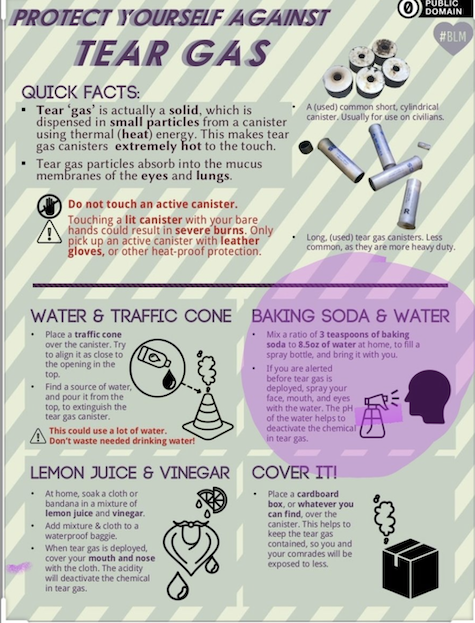
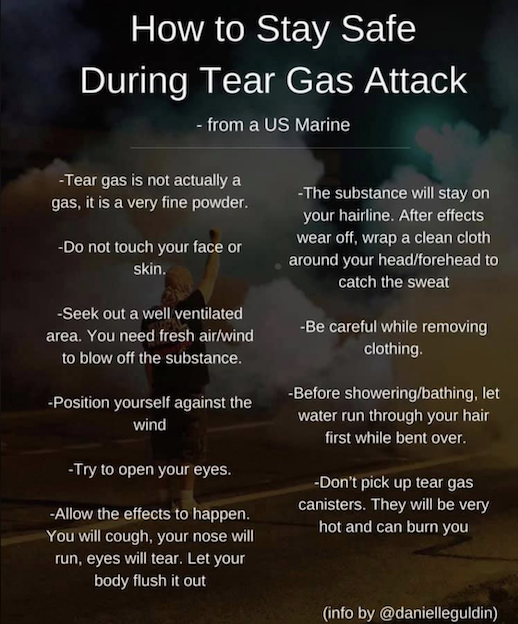
Throw on your protective gear if it’s not already on. Again, decide whether you want to disperse or hold your ground (and likely risk arrest). The Philly Police force has a history of using a ‘three warning system’ with activists before actually arresting them, but I definitely would NOT bank on this anymore - if fact, we’ve seen quite the opposite: forced dispersal methods and arrests with no warnings whatsoever.
6. In the event of an arrest:
KNOW YOUR FRIGGIN’ RIGHTS!!!! If you don’t, the safe phrase is always “I am remaining silent. I want to speak to a lawyer.” If you or any of your things are searched without an accurate, recent, judge-ordered warrant, you should repeat “I do not consent to this search”. Police should only conduct a ‘pat down’ if they suspect you may have a weapon. Ditch your sign.
Most importantly, do not resist arrest, make sure your hands are visible, and stay calm.
After the protest
1. Donate to bail funds if there were arrests made
2. Be prepared for cleanup
Let’s be honest, protesting can leave quite a mess behind.
3. Debrief with someone trusted
Protests can bring up a lot of emotions that span the spectrum, especially for the black community at this time. Talk about the experience, what you thought went well, what didn’t, and your plans going forward.
4. Plan your next action
Constant pressure in any campaign is pivotal in achieving your demands. Think about your next step. Check here for upcoming events, or visit the BLM Philly social channels.
5. Consider getting tested for COVID-19
But I’ve heard directives to wait 7 days after you were exposed to a crowd. Check for testing centers that are suited to your needs.
6. Report any Police misconduct to the Philadelphia DA Special Investigations Unit
215-686-9608
Please contact me with any inaccuracies, or information I’ve missed.